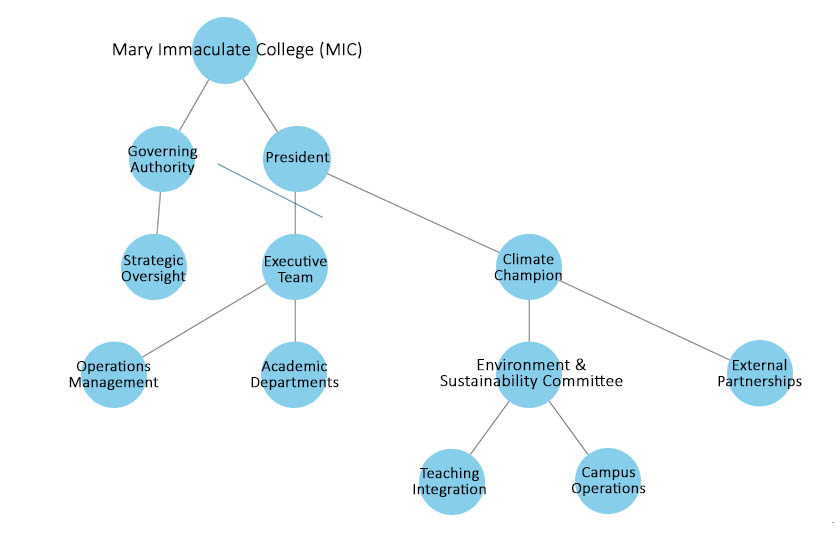Theme 6: Leadership & Governance
About
Mary Immaculate College (MIC) recognises that strong leadership and effective governance are essential for driving its ambitious climate action and sustainability goals. Anchored by an institutional commitment to integrate sustainability across all areas—teaching, research, campus operations, and community engagement—MIC has developed a robust governance structure to ensure oversight, accountability, and continuous improvement in its sustainability efforts.
The leadership team at MIC, including the executive management, the Environment and Sustainability Committee, and a designated Climate Champion, provides strategic direction, mobilises resources, and fosters a culture of shared responsibility for environmental action. Through data monitoring, evaluation frameworks, and evidence-based decision-making, MIC ensures that its projects and initiatives deliver measurable outcomes aligned with national and international sustainability benchmarks.
The Governing Authority determines the content and the success of implementation for the two primary vehicles for demonstration of accountability and impact in the higher education system context, including the institutional strategic plan, and the Performance Agreement with the HEA (2024-2030), which contains specific targets and deliverables in respect of curricular integration of the SDGs as well as the decarbonisation goals under the Climate Mandate.

Strategic Leadership for Sustainability
The Role of the Executive Team
The MIC Executive Team plays a critical leadership role in embedding sustainability into the college’s strategic priorities. They oversee the development of MIC’s Climate Action Roadmap 2030, ensuring alignment with national mandates, such as the Irish government’s Public Sector Climate Action goals, and global frameworks, including the United Nations’ Sustainable Development Goals (SDGs).
Key actions include:
- Ensuring sustainability is a core pillar of institutional planning, resource allocation, and operational decision-making.
- Championing partnerships with key stakeholders to advance research, teaching, and outreach goals.
- Supporting innovative initiatives, such as the Green Campus Programme, and the resourcing of interdisciplinary sustainability-focused academic programmes.
The Environment and Sustainability Committee
The Environment and Sustainability Committee is a cross-functional group of academic staff, operations managers, and executive representatives tasked with ensuring that sustainability is integrated into MIC’s teaching, research, and lived campus experience. On behalf of the Executive Team it provides an oversight framework for climate action initiatives and connects academic expertise with operational best practices. See Appendix X for the Committee’s terms of reference.
Key Responsibilities of the Committee:
- Oversee and coordinate MIC’s climate-related projects, ensuring alignment with institutional goals.
- Monitor sustainability initiatives across the campus, evaluating their progress and impact.
- Develop and implement strategies for resource efficiency, energy conservation, and biodiversity enhancement.
- Provide leadership in designing sustainability-focused professional development for staff and embedding environmental literacy into curricula.
- Foster a culture of collective action by engaging staff, students, and external stakeholders.
Overall Aim
To act in accordance with the College’s Mission Statement, for mobilisation of institutional knowledge and resources towards timely, impactful, sustainable, just and socially responsible safeguarding of the shared environment, in all of its forms.
Responsibilities
- To represent, through the Committee’s diversity of membership and through its inclusive engagement across the broader communities of interest within the institution, knowledge capital possessed by the College with particular relevance for climate change issues, sustainability, and safeguarding of the environment.
- To act as champions across the College’s governance, operational and academic domains, for active promotion of the shared agenda to bring about environmental sustainability.
- To act as an advisory body for College management (and for key functional units) in respect of the necessity of adopting relevant national and international climate protection and sustainability goals and targets, practical methods by which such targets can be reached most effectively, the manner in which implementation outcomes should be reported to internal and external stakeholders, and of institutional policy development.
- To be available as an advisory forum for the MIC academic community, and for other relevant units within the College, towards engagement with climate action and environmental sustainability issues in programme design and pedagogy, peer networking, research, innovation, and external outreach.
- To provide relevant advice and guidance to College representatives with responsibility for meeting institution-level compliance obligations.
- To provide advice and guidance towards formation of College strategy for articulation and achievement of climate protection and sustainability goals relevant to institutional mission.
- To co-ordinate and support relevant College bodies in the application, attainment and retention of Green Flag status.
- To provide advice and guidance towards capital development planned and undertaken by the College.
- To enable the College to influence relevant external policy and legislative formation across all sectors in which the College’s mission receives expression.
- To provide appropriate and effective channels of communication and discourse within the College community aimed at knowledge exchange and dissemination in respect of key issues relating to climate change and environmental sustainability.
- To collaborate actively, and as appropriate, with all other committees of the College, in furthering the work of the Committee as out in these Terms of Reference.
- To provide the Executive Team (to which the Committee reports) with an annual report setting out the record of meetings, important developments and achievements.
Nominated
- Chairperson (ET Nominee)
Gary O'Brien - Vice-President Administration & Finance*
Michael Keane (Climate Champion) - Director of EDII*
Lorraine McIlrath - Dean of Arts (or nominee)*
William Leahy - Dean of Education (or nominee)*
Angela Canny - Head of School, MIC Thurles (or nominee)*
Jennifer Johnson - Director of Enterprise & Community Engagement*
- Maeve Liston
- Director of Teaching & Learning*
Katherine Whitehurst - Director of Estates & Sustainability*
Rachel Costello - Buildings & Estates Manager*
Ger O'Donoghue - RGSO (VPR's nominee)
Mary Collins - Faculty of Arts (Faculty Board nominees)
Deirdre Brady
Angela Cloke-Hayes
Vacant
John Morrissey - Faculty of Education (Faculty Board nominees)
Anne Dolan
Brighid Golden
Tanya de Paor
Vacant - Professional Services Staff (Elected)
Caroline Coyne
Jeanette Ferguson
Eoin Martin
Ruth Talbott - MIC Student Body (MISU President's nominees)
Aisling Knox (MISU President)
Jimmy Ogwal (MISU Vice President)
*Ex Officio
The Climate Champion
To strengthen leadership in sustainability, MIC has designated a Climate Champion at Vice-President level. Reporting directly to the College President, the Climate Champion is a key institutional figure responsible for driving climate action and ensuring alignment across governance, operations, and academic activities.
Key responsibilities of the Climate Champion:
- Raising awareness about sustainability initiatives among students, staff, and external partners while maintaining MIC’s public profile as a leader in climate education.
- Working closely with the Executive Team and Environment and Sustainability Committee to develop climate-focused policies and projects.
- Coordinating with external organisations, such as SEAI, Science Foundation Ireland, and environmental NGOs, to advance MIC’s sustainability agenda.
- Overseeing the collection and monitoring of climate-related data and assessing the effectiveness of sustainability projects.
Monitoring, Evaluation, and Accountability
To ensure the effectiveness and impact of its sustainability projects and initiatives, MIC has implemented a rigorous system for data monitoring, evaluation, and reporting. These processes ensure transparency, accountability, and continuous improvement:
Monitoring of Available Data
MIC collects and analyses comprehensive data on key performance indicators (KPIs) related to climate action and sustainability:
- Energy consumption and emissions data across campus facilities.
- Metrics on biodiversity projects, such as the Tiny Forest Initiative and campus green spaces.
- Participation rates and feedback from professional development programmes and student outreach activities.
- Tracking progress towards achieving targets in the Climate Action Roadmap 2030 and reporting through the external SEAI Monitoring & Reporting Tool.
Evaluation of Project Effectiveness
MIC employs both qualitative and quantitative evaluation frameworks to assess the impact of its sustainability initiatives.
Key approaches:
- Baseline and Comparative Analysis: Benchmarking progress against established sustainability targets, such as energy reduction and biodiversity enhancement goals.
- Impact Assessments: Evaluating the tangible outcomes of projects like the SEAI Schools Programme, Science Week, and professional development workshops.
- Stakeholder Feedback: Gathering input from staff, students, and community partners to measure engagement, satisfaction, and behavioural changes driven by MIC’s initiatives.
- Publication of Results: MIC ensures findings are shared widely through reports, publications, and conferences to highlight successes and inform policy.
Accountability and Reporting
MIC prioritises transparency and accountability by producing regular reports that outline progress in sustainability governance and climate action:
- Annual Sustainability Report: A comprehensive document that details MIC’s achievements, challenges, and plans for future sustainability initiatives.
- Chief Officer’s Annual Report: A section of the Annual Report synopsises key goals and outcomes in respect of climate action and sustainability at the College.
- Climate Action Roadmap Updates: Regular updates on progress towards 2030 targets, including emissions reductions, energy savings, and campus sustainability improvements.
- Impact Reports on Partnerships: Highlighting outcomes from collaborations with SEAI, SFI, Leaf Ireland, and community organisations to demonstrate the success of joint initiatives.
The Role of the Governing Authority
The Governing Authority of Mary Immaculate College (MIC) plays a pivotal role in ensuring public accountability and providing proactive strategic direction in the implementation of climate action and sustainability goals. As the institution’s highest governing body, it oversees the alignment of MIC’s activities with national and international frameworks, such as the Irish government’s Public Sector Climate Action Mandate and the United Nations’ Sustainable Development Goals (SDGs).
Key Responsibilities of the Governing Authority:
- Strategic Oversight: Providing clear guidance and leadership to ensure that sustainability remains central to MIC’s institutional mission, strategic plans, and operational activities.
- Public Accountability: Upholding transparency by overseeing the delivery of measurable progress against climate targets, including emissions reductions, energy efficiency improvements, and community engagement.
- Resource Allocation: Ensuring appropriate financial and human resources are allocated to support MIC’s sustainability initiatives, research, and teaching innovations.
- Monitoring and Reporting: Reviewing progress reports, sustainability impact assessments, and Climate Action Roadmap updates to ensure accountability and continuous improvement.
- Risk Management: Identifying and mitigating risks related to environmental and sustainability challenges while fostering innovation in strategy implementation.
Key Actions for Implementation
To strengthen leadership and governance in sustainability, MIC will:
- Reconceptualise the role of the Climate Champion with clear deliverables and reporting structures.
- Develop a Sustainability Impact Dashboard to monitor real-time data on emissions, energy efficiency, and project participation.
- Expand the remit of the Environment and Sustainability Committee to oversee all climate-focused initiatives within a decentralised ‘hub-and-spoke’ system and provide strategic guidance to College stakeholders through this mechanism.
- Establish annual Sustainability Forums to engage staff, students, and partners in reviewing progress and setting priorities.
- Implement a Continuous Improvement Framework that integrates regular evaluation, stakeholder feedback, and adaptive project strategies.
- About
- Strategic Leadership for Sustainability
- Monitoring, Evaluation, and Accountability
- Accountability and Reporting
- Key Actions for Implementation







